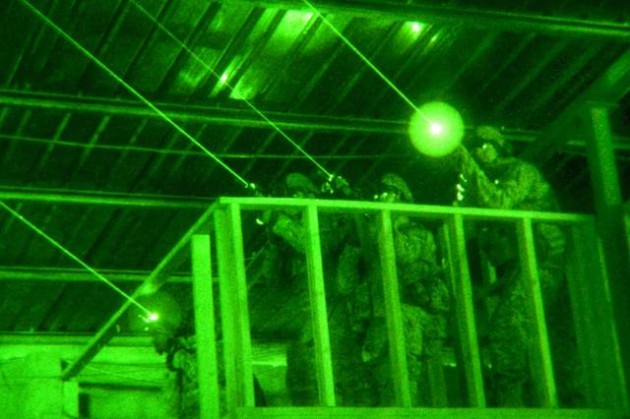ARMY WAR COLLEGE: A massive wargame held here this week to explore the “Deep Future” of warfare in the 2030s demonstrated a stark truth — one that Clausewitz enumerated in his famous work, On War — there’s no substitute for sheer numbers, no matter how much high technology the Army buys. That’s an unsettling answer at a… Keep reading →
Defense
Servicemembers Doubt Congress Will Act In Time To Avoid Government Shutdown, First Command Reports
By businesswireThe majority of servicemembers and their families doubt that lawmakers will take appropriate actions to avoid a government shutdown in October or a second round of sequestration in the coming year, according to the First Command Financial Behaviors Index®. The latest survey results reveal that 86 percent of middle-class military families (senior NCOs and commissioned… Keep reading →
Purdue University Software Toolkit Provides Visual Analytics to Aid Law Enforcement, First-Responders
By businesswirePurdue University researchers have developed a new tool for law enforcement officers and disaster assistance first-responders to reduce crime and assist people. The tool is called the Visual Analytics Law Enforcement Toolkit, or VALET. Developed at Purdue’s Homeland Security Center of Excellence, the toolkit software provides real-time data so officers can analyze high-volume criminal, traffic… Keep reading →
Siemens Government Technologies, Inc. announced today that the United States Coast Guard has awarded a $5.3 million task order to install and implement energy-conserving upgrades at the U.S. Coast Guard Base in Elizabeth City, North Carolina. Using an Energy Savings Performance Contract (ESPC) from the Department of Energy, the cost of the project will be… Keep reading →
 “The United States has built the most powerful military the world has ever seen, but we are not invincible. Information technology is a both an essential enabler of American power, but it is also our Achilles heel. And that’s why this project is so important,” said Virginia Congressman Jim Moran, referring to a new cybersecurity research center opened by L-3 and Virginia Tech in Arlington, Va., Oct. 5.
“The United States has built the most powerful military the world has ever seen, but we are not invincible. Information technology is a both an essential enabler of American power, but it is also our Achilles heel. And that’s why this project is so important,” said Virginia Congressman Jim Moran, referring to a new cybersecurity research center opened by L-3 and Virginia Tech in Arlington, Va., Oct. 5.
“Cyberspace is the soft underbelly of American power,” said Moran, who called the need for more effective solutions for cyberspace an “urgent national priority.” Keep reading →
 Complexity is the name of the game in today’s high-volume identity environments.
Complexity is the name of the game in today’s high-volume identity environments.
“For larger organizations and in customer-facing environments, the quantity and size of datasets are increasing along with performance expectations and data diversity,” notes Gartner analyst Kevin Kampman in his recent report, “The Role of Virtual Directory and Synchronization Services in Large-Scale Identity Deployments.” Keep reading →

LAS VEGAS (CNNMoney) — Wearing a t-shirt and jeans, America’s top spymaster — National Security Agency Director Gen. Keith Alexander, also the head of the U.S. Cyber Command — took the stage Friday at the nation’s largest hacker convention to deliver a recruiting pitch.
“In this room, this room right here, is the talent our nation needs to secure cyberspace,” Alexander told the standing-room-only audience at DefCon, a grassroots gathering in Las Vegas expected to draw a record 16,000 attendees this year. “We need great talent. We don’t pay as high as everybody else, but we’re fun to be around.” Keep reading →

In the wake of Flame, there have been many interesting headlines bubbling up over the past several weeks regarding policy development of cyber “offensive” measures and the future of overall worldwide cyberwar policy. Perspectives vary greatly as to the future of cyber offensive measures, with one author going so far as to say that the world will be a better place when war strategies shift from the physical to the cyber realm.
One thing is clear – discussions of ‘striking back’ at an entity that has just hacked a government system or retaliating when a breach is identified signals a significant change in the traditional US Government mindset and combat philosophy in general. Will the change from a primarily defensive strategy in securing government systems to an “offense” mentality improve our national security posture? Likely so. Are we prepared to engage? It appears we are even willing to make a first strike. Keep reading →
 The White House has issued an executive order today aimed at improving the security of classified networks and preventing the release of documents to organizations such as WikiLeaks that have compromised classified and delicate intelligence information.
The White House has issued an executive order today aimed at improving the security of classified networks and preventing the release of documents to organizations such as WikiLeaks that have compromised classified and delicate intelligence information.
The so-called “WikiLeaks Order“ issued by President Obama on Friday emphasizes the need for structural reforms by making agencies primarily responsible for the information they obtain and share. Keep reading →

The sheer size of the Department of Defense (DoD) makes streamlining IT operations or changing IT investment management daunting, yet this size makes the payoff of successes that much greater.
To achieve these successes, we are looking to reap the benefits of today’s leading edge thinking and technologies in many of the IT management efforts we have underway. Several of our initiatives dovetail nicely with the 25 Point Implementation Plan to Reform Federal IT Management, such as the IT Enterprise Strategy and Roadmap and cloud computing strategy that the Department is currently developing. Keep reading →
